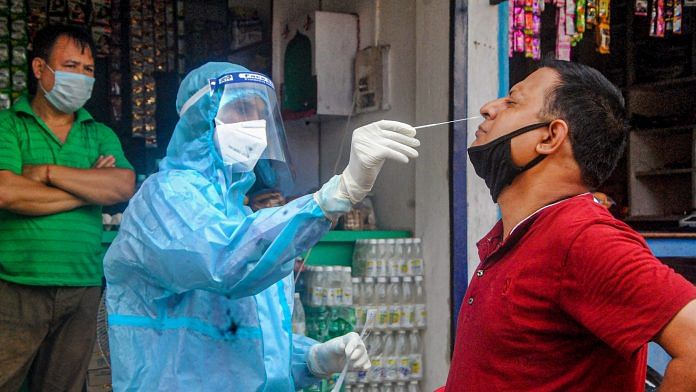New Delhi: It has been nine months since the coronavirus pandemic first started and there is new research available on the behaviour of Covid-19, its spread and strategies to fight the virus, said ThePrint’s Editor-in-Chief Shekhar Gupta in episode 582 of ‘Cut the Clutter’.
He cited epidemiologist Ramanan Laxminarayan’s data-based research, which is peer-reviewed, from contact tracers in Tamil Nadu and Andhra Pradesh. The two states have a pretty robust public health system and epidemiology system.
The data is of nearly half a million people who’ve been traced as contacts of those who were infected.
Also read: Where do used Covid masks, gloves end up? Infection surge creates waste problem for India
Superspreaders
The research noted that only 8 per cent Covid positive patients were responsible for infecting two-thirds of the total cases and another 71 per cent infected anybody. This indicates that we have to find the super-spreaders, as opposed to every positive case.
More and more research is showing that coronavirus is a disease that spreads in clusters, Gupta said. “It is a virus that spreads like burst fire.”
A second set of data and analysis revealed that most of the virus spread took place at some event.
“There are super-spreader individuals and super-spreader events. There is no variety or mutant of the virus which is a super-spreader,” Gupta said.
Zeynep Tufekci’s article in The Atlantic magazine also raised some fundamental questions about the Covid pandemic. Tufekci is an assistant professor in the University of North Carolina of digital technology, artificial intelligence and society.
She questioned why only three districts of northern Italy account for 25,000 of all the 36,000 people who died in the country. The district of Lombardy accounts for 17,000 of all the 25,000 people that died in northern Italy.
Furthermore, she asked why it was only in Quito, the capital of Ecuador, that a rush of bodies were lying on the roadside in the beginning of the pandemic.
Tufekci says that this is because coronavirus is an over-dispersed pathogen. R number is the number of people a person would infect after he or she gets infected. Tufekci says that it is time to move on from R-naught, and look into a new factor called dispersion. It essentially refers to the circumstances under which an infected person can spread the virus to a lot of people.
Dr Faheem Younus, Chief of Infectious Diseases from University of Maryland, said that viral shedding is the highest on day 2 or 3 of the infection.
A Hong Kong study, quoted by Tufekci notes that 19 per cent of people in Hong Kong were responsible for 80 per cent transmission and 69 per cent of the infected people didn’t infect anyone else.
In another study from New Zealand, the genomes of all 277 introductory cases in the country have been broken down, in which, the researchers figured that 19 to 20 per cent have infected a large majority of these cases.
“Covid spread follows Pareto Principle — Vilfredo Pareto was a sociologist who said that if you want to see 80 per cent of the problem somewhere, you will find 80 per cent outcome of interest to you in any situation, which is caused by 20 per cent of the inputs,” Gupta said.
“These 20 per cent inputs were the super spreaders who were at the wrong place at the wrong time, with the wrong ventilation and the wrong environment,” Gupta explains.
Oshitani Hitoshi, a Japanese professor’s study says that you have to look for clusters. Japan never had a lockdown, never stopped its highly crowded public transport and also has the oldest population in the world.
Also read: Covid infection falling in Mumbai slums, but rising in non-slum areas, second sero survey says
Super-spreader events
Six cabinet ministers led by Home Minister Amit Shah, several secretaries, several chief ministers and Vice President Venkaiah Naidu have been infected with Covid-19. These people have to be in crowded places, they are exposed to super-spreaders and super-spreader events.
Four factors that contribute to Covid spread, as highlighted by Professor Muge Cevik from University of St. Andrews, are — prolonged contact, poor ventilation, presence of a highly infectious person (day of the infection) and crowding.
“We have to now go for cluster busting because when clusters come together they become mega clusters,” Gupta said. Laxminarayan’s research states that much of India’s spread can be ascribed to super-spreaders, clusters and mega clusters.
“You can reduce super-spreader events by avoiding the three C formula — crowds, closed spaces & close contact, as the virus spreads in clusters, it’s an over-spreader and relies on over dispersion, and loves crowding in closed spaces and close contact,” Gupta said.
“If governments trace backwards, they may be able to contain the problem at its roots,” Gupta added.
Watch the latest episode of CTC here:




Sir would like you to cover 1, why amnesty left india 2. DGP involved in pulwama conspiracy , what is case status
Here is an extract from my post which was not put out by The Print. (I am not holding it agains TP. They may have their reesons). This extract is relevant
“…….The requirement of the day should be to restrict the base line going forward. It may be best now to adopt a logical assessment rather than a statistical study to contain the pandemic going forward.”
A similar action should be taken to revive the economy rather than just go by the “normal” statistics.